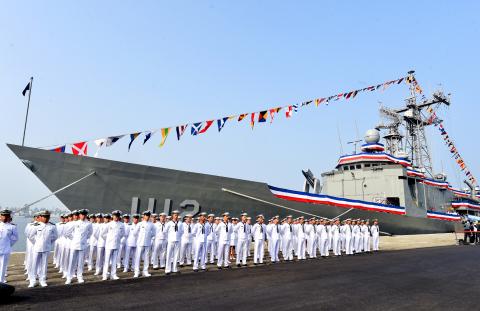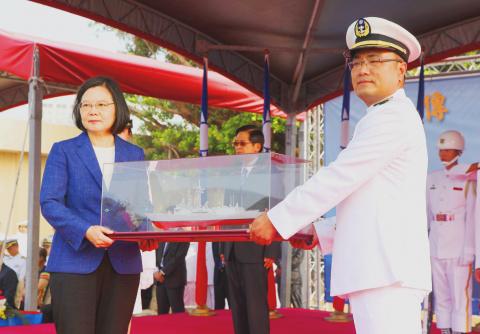President Tsai Ing-wen (蔡英文) yesterday vowed that the nation would not “concede one step” in defending itself as she inaugurated two frigates purchased from the US.
The two Perry-class guided missile frigates were commissioned in a ceremony at the Zuoying naval base in Kaohsiung.
Built in the 1980s, the frigates were originally named USS Taylor and USS Gary, and were part of a US$1.8 billion arms deal to Taiwan announced in 2015 under then-US president Barack Obama. They have been renamed Ming Chuan (銘傳) and Feng Chia (逢甲).

Photo: Chien Jung-fong, Taipei Times
They have “high mobility, high sea resistance and low noise,” and are fitted with the SQR-19 sonar system currently used by the US Navy, the Republic of China Navy said.
The ships are to patrol the Taiwan Strait, it added.
Navy Chief of Staff Vice Admiral Lee Tsung-hsiao (李宗孝) had previously said that the warships’ anti-submarine capabilities are more advanced than the nation’s eight Cheng Kung-class frigates and could have a “deterrent effect” against Chinese submarines.

Photo: Chien Jung-fong, Taipei Times
“We want to send a clear and firm message from Taiwanese to the international community that we will not concede one step in defending ... Taiwan and protecting our free and democratic way of life,” Tsai said after inspecting the ships.
Beijing’s “military actions in the region not only attempt to weaken Taiwan’s sovereignty, but also damage regional peace and stability,” Tsai said.
She highlighted the unconventional “three warfare” threats from the Chinese People’s Liberation Army: psychological, public opinion and legal warfare.
The global security situation is undergoing rapid change and the nation is facing a new array of security challenges, including China’s military exercises near the nation’s periphery, she said.
Beijing deploys conventional and unconventional military methods against Taiwan, including leveraging information technology, the Internet and new media to flood Taiwan with disinformation, she said.
Incessant cyberattacks on the nation’s government and enterprises are a national security threat that Taiwan must confront by self-strengthening — its unchanging principle to protect its place in the world, she said.
“It is my solemn hope that the armed forces will follow three noes: no forgetting the mission to defend Taiwan, no giving up on safeguarding regional peace and stability, and no forgetting the threat of foreign forces,” she said.
The American Institute in Taiwan (AIT) in a news release said that the sale of the warships contributes to the military balance in the Indo-Pacific region.
“This sale is consistent with US commitments under the Taiwan Relations Act to provide military articles that support Taiwan’s self-defense,” the institute said.
The frigates “will improve Taiwan’s capability in current and future defensive efforts, and further Taiwan’s continuing work to modernize its armed forces,” it said.
The AIT said it sent representatives to yesterday’s ceremony, including AIT Kaohsiung head Matthew O’Connor and members of the AIT team “to signify our enduring support to Taiwan’s defense under the provisions of the Taiwan Relations Act of 1979.”

Seventy percent of middle and elementary schools now conduct English classes entirely in English, the Ministry of Education said, as it encourages schools nationwide to adopt this practice Minister of Education (MOE) Cheng Ying-yao (鄭英耀) is scheduled to present a report on the government’s bilingual education policy to the Legislative Yuan’s Education and Culture Committee today. The report would outline strategies aimed at expanding access to education, reducing regional disparities and improving talent cultivation. Implementation of bilingual education policies has varied across local governments, occasionally drawing public criticism. For example, some schools have required teachers of non-English subjects to pass English proficiency

‘FORM OF PROTEST’: The German Institute Taipei said it was ‘shocked’ to see Nazi symbolism used in connection with political aims as it condemned the incident Sung Chien-liang (宋建樑), who led efforts to recall Democratic Progressive Party (DPP) Legislator Lee Kun-cheng (李坤城), was released on bail of NT$80,000 yesterday amid an outcry over a Nazi armband he wore to questioning the night before. Sung arrived at the New Taipei City District Prosecutors’ Office for questioning in a recall petition forgery case on Tuesday night wearing a red armband bearing a swastika, carrying a copy of Adolf Hitler’s Mein Kampf and giving a Nazi salute. Sung left the building at 1:15am without the armband and apparently covering the book with a coat. This is a serious international scandal and Chinese

TRADE: The premier pledged safeguards on ‘Made in Taiwan’ labeling, anti-dumping measures and stricter export controls to strengthen its position in trade talks Products labeled “made in Taiwan” must be genuinely made in Taiwan, Premier Cho Jung-tai (卓榮泰) said yesterday, vowing to enforce strict safeguards against “origin laundering” and initiate anti-dumping investigations to prevent China dumping its products in Taiwan. Cho made the remarks in a discussion session with representatives from industries in Kaohsiung. In response to the US government’s recent announcement of “reciprocal” tariffs on its trading partners, President William Lai (賴清德) and Cho last week began a series of consultations with industry leaders nationwide to gather feedback and address concerns. Taiwanese and US officials held a videoconference on Friday evening to discuss the

PERSONAL DATA: The implicated KMT members allegedly compiled their petitions by copying names from party lists without the consent of the people concerned Judicial authorities searched six locations yesterday and questioned six people, including one elderly Chinese Nationalist Party (KMT) member and five KMT Youth League associates, about alleged signature forgery and fraud relating to their recall efforts against two Democratic Progressive Party (DPP) legislators. After launching a probe into alleged signature forgery and related fraud in the KMT’s recall effort, prosecutors received a number of complaints, including about one petition that had 1,748 signatures of voters whose family members said they had already passed away, and also voters who said they did not approve the use of their name, Taipei Deputy Chief Prosecutor